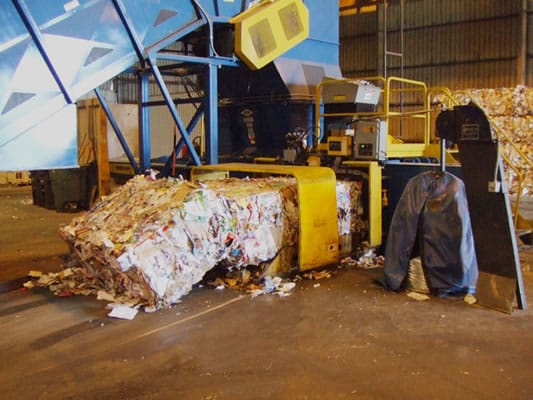5 Types of Materials Appropriate for Baling
December 27, 2022
Industrial and commercial waste and recycling balers reduce trash volume by compacting waste into easy-to-manage cubes. Once formed, these cubes can be quickly shipped or transported to corresponding facilities. Baling materials such as aluminum and other metals can often be sold, providing an effective way to recoup some of the expenses associated with purchasing and maintaining your baler. However, not all materials are meant to be used within a baling system. We’ll cover the most common materials that can be bailed in the sections below.
Materials Used in Recycling & Waste Balers
Baling involves carefully packaging and compressing a bundle of materials for storage, transportation, or shipment. Most of the time, baling is done using cords, wires, hoops, or by wrapping the material with a durable cover. Viable materials that can be used within balers include:
- Paper products
- Cartons
- Electronics
- Non-ferrous metals
- Plastics
Paper Materials
Paper products that include cardboard, newspapers, books, magazines, and periodicals are all ideal candidates for baling. Paper’s light structure and ability to be efficiently compressed allow the material to be easily bundled and shipped.
Electronic Waste
With the quick advancement of technology, more and more electronic products are being discarded daily. Facilities that collect unwanted electronic products need to save space. Utilizing recycling and waste balers to compress E-waste allows facilities to organize better-used electronics into easy-to-ship cubes that can potentially be sold for cash.
Cartons
Whether it’s refrigerator-only or shelf-stable cartons, carton products are baler-use ready. Cartons, like paper products, are easily crushable, allowing many materials to be baled within a single square bundle. Since cartons are manufactured from lighter materials, they can easily be transported and shipped to facilities that dispose of or convert the used materials into new packaging.
Non-Ferrous Metals
Non-ferrous metals such as aluminum, copper, nickel, and lead do not contain iron and are easily crushable and eligible for baling. Ferrous metals must undergo a different compression process since they are thicker and heavier. Compressed and baled non-ferrous metals can be sold to metal processing facilities to offset production costs.
Plastics
Plastic products are among the most necessary materials to bale since they come in a wide range of shapes and sizes. Before plastics can be remolded into new forms for repackaging and distribution, they must be shipped to a facility with the machinery to break down the plastic material, if possible, and re-structure it into a new product.
EMP’s Partners Provide the Waste and Recycling Balers You Need
Balers are state-of-the-art machines that condense a wide range of materials into cubes that can be easily stored and transported. Many materials can be effectively baled, including non-ferrous metals, plastics, paper products, cartons, and more. Contact EMP for more information on how we can improve your business, or check out our partner’s pages to learn more about their product offerings.